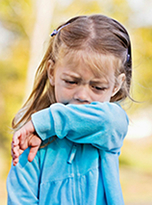Read and report vaccine reactions, harassment and failures.

Measles is a highly-contagious viral disease that is spread through the air by respiratory droplets (coughing, sneezing, etc) or by coming in contact with nasal discharge/mucous of an infected person.
Measles is most contagious during the three days before the rash appears. The rash usually begins as red flat spots on the face and neck and works its way down the body towards the feet. Raised red bumps may also appear on the flat red spots and as the rash spreads downwards, the spots may join together. Fever may also occur when the rash first appears. The rash lasts 3-7 days and fades in the order in which it appeared. The fever can linger 2-3 more days, and the cough can last for up to 10 days after the rash has subsided.
Measles can be easily transmitted inclose quarters; for example, by family members at home, students in schools or children in daycare centers, or between travelers using public transportation. Other settings for transmission of measles may include public places where large numbers of people gather and have close contact. Measles transmission in a susceptible person has been documented up to 2 hours after a contagious person has left the room.
According to the U.S. Centers for Disease Control (CDC), Americans born before 1957 have naturally-acquired immunity to measles through past exposure to the illness. Infants born to mothers with naturally-acquired antibodies to measles benefit from passive maternal immunity. There is also evidence that mothers who have recovered from measles pass short-term measles immunity to their infants by breastfeeding.
Conversely, recent medical literature reports that infants born to vaccinated mothers have lower levels of maternal antibodies and lose them earlier compared to infants whose mothers had developed natural immunity from prior measles infection. As a result, most infants born to vaccinated mothers are at a high risk of developing measles due to the poor quality and shorter duration of maternal antibodies.
IMPORTANT NOTE: NVIC encourages you to become fully informed about Measles and the Measles vaccine by reading all sections in the Table of Contents , which contain many links and resources such as the manufacturer product information inserts, and to speak with one or more trusted health care professionals before making a vaccination decision for yourself or your child. This information is for educational purposes only and is not intended as medical advice.



